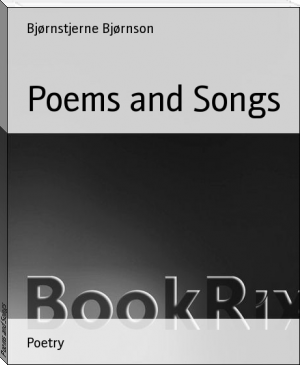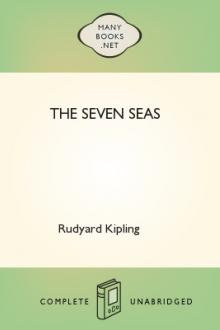Poems and Songs - Bjørnstjerne Bjørnson (novel books to read .TXT) 📗

- Author: Bjørnstjerne Bjørnson
Book online «Poems and Songs - Bjørnstjerne Bjørnson (novel books to read .TXT) 📗». Author Bjørnstjerne Bjørnson
INTRODUCTION
BJÖRNSON AS A LYRIC POET
I lived far more than e'er I sang;
Thought, ire, and mirth unceasing rang
Around me, where I guested;
To be where loud life's battles call
For me was well-nigh more than all
My pen on page arrested.
What's true and strong has growing-room,
And will perhaps eternal bloom,
Without black ink's salvation,
And he will be, who least it planned,
But in life's surging dared to stand,
The best bard for his nation.
A life seventy-seven years long and but two hundred pages of lyrical production, more than half of which was written in about a dozen years! The seeming disproportion is explained by the lines just quoted from the poem _Good Cheer_, with which Björnson concluded the first edition of his _Poems and Songs_. Alongside of these stanzas, in which the cause of his popularity and powerful influence is also unconsciously revealed, may well be placed the following one from _The Poet_, which discloses to us the larger conception of the mission that Björnson himself in all his work and life, no less than in his lyrics, so finely fulfilled:
The poet does the prophet's deeds;
In times of need with new life pregnant,
When strife and suffering are regnant,
His faith with light ideal leads.
The past its heroes round him posts,
He rallies now the present's hosts,
The future opes
Before his eyes,
Its pictured hopes
He prophesies.
Ever his people's forces vernal
The poet frees, --by right eternal.
"The best bard for his nation" is he who "does the prophet's deeds," who "rallies now the present's hosts," and "frees, --by right eternal." Poet and prophet Björnson was, but more than all else the leader of the Norwegian people, "where loud life's battles call," through conflict unto liberation and growth. It has been said that twice in the nineteenth century the national soul of Norway embodied itself in individual men,--during the first half in Henrik Wergeland and during the second half in Björnstjerne Björnson. True as this is of the former, it is still more true of the latter, for the history of Norway shows that the soul of its people expresses itself best through will and action. Björnson throughout all his life willed and wrought so much for his country, that he could give relatively little time and power to lyrical self-expression. But Björnson strikingly represented the past of Norway as well as his contemporary age. He was a modern blending of the heroic chieftain and the gifted skald of ancient times. He was the first leader of his country in a period when the battles of the spirit on the fields of politics and economics, ethics, and esthetics were the only form of conflict,--a leader evoking, developing, and guiding the powers of his nation into fuller and higher life. In his many-sidedness Björnson was also in his time the first skald of his people, almost equally endowed with genius as a narrative, a dramatic, and a lyric poet; with talents scarcely less remarkable as an orator, a theater-director, a journalistic tribune of the people (his newspaper articles amounted, roughly estimated, to ten thousand book-pages), a letter-writer, and a conversationalist. If, furthermore, we take into account also Björnson's labors and achievements in the domain of action more narrowly considered, it is no wonder that his _Poems and Songs_ make only a small volume. Examining the book more closely, we find that three-quarters of its pages were written before the year 1875, so that the lyrical output, here published, of the thirty-four years thereafter amounts to but fifty pages. From the year 1874 on in Björnson's life the chieftain supplanted the skald, so far as lyrical utterance was concerned. He was leading his nation in thought and action on the fields of theology and religion, of politics, economics, and social reform; he was tireless in making speeches, in writing letters and newspaper articles; his poetic genius flowed out copiously in the dramatic and epic channels of his numerous modern plays, novels, and stories. That soon after 1874 Björnson passed through a crisis in his personal thought and inner life was probably, in view of the sufficient explanation suggested above, without influence in lessening his production of short poems. This crisis was in his religious beliefs. His father was a clergyman in the Lutheran State Church, and from his home in western Norway Björnson brought with him to Christiania in 1850 fervent Christian faith of the older orthodox sort. Here his somewhat somber religion was soon made brighter and more tender by the adoption of Grundtvig's teachings, and until past mid-life he remained a sincere Christian in the fullest sense, as is repeatedly shown in his lyrics. But in the years just before 1877 study of modern science and philosophy, of the history of the Church and dogma, led him to become an evolutionist, an agnostic theist. Nevertheless, he ever practiced the Christian art of life, as he tried to realize his ideals of truth, justice, and love of humanity. This large and simple Christian art of life, in distinction from the dogmas of the Church, he early sung in lines which sound no less true to the keynote of his later years:
Love thy neighbor, to Christ be leal!
Crush him never with iron-heel,
Though in the dust he's lying!
All the living responsive await
Love with power to recreate,
Needing alone the trying.
II
The quantity, then, of Björnson's short poems is small. Their intrinsic worth is great. Their influence in Norway has been broad and deep, they are known and loved by all. If lyrical means only melodious, "singable," they possess high poetic value and distinction. In a unique degree they have inspired composers of music to pour out their strains. When a Scandinavian reads Björnson's poems, his ears ring with the familiar melodies into which they have almost sung themselves. Here is not the place for technical analysis of the external poetic forms. A cursory inspection will show that Björnson's are wonderfully varied, and that the same form is seldom, if ever, precisely duplicated. In rhythm and alliteration, rhyme sequence and the grouping of lines into stanzas, the form in each case seems to be determined by the content, naturally, spontaneously. Yet for one who has intimately studied these verses until his mind and heart vibrate responsively, the words of all have an indefinable melody of their own, as it were, one dominant melody, distinctly Björnsonian. This unity in variety, spontaneous and characteristic, is not found in the earlier poems not included in this volume. So far as is known, Björnson's first printed poem appeared in a newspaper in 1852. It and other youthful rhymes of that time extant in manuscript, and still others as late as 1854, are interesting by reason of their contrast with his later manner; the verse-form has nothing personal, the melodies are those of older poets. It is in the lyrics of _Synnöve Solbakken_, written in 1857 or just before, that Björnson for the first time sings in his own forms his own melody. Style and diction are the determining factors in the poetic form of lyric verse, along with the perhaps indistinguishable and indefinable quality of melodiousness. Of Björnson's style or manner in the larger sense it must be said that it is not subjectively lyrical. He is not disposed to introspective dwelling on his own emotions and to profuse self-expression without a conscious purpose. In general he must have some definite objective end in view, some occasion to celebrate for others, some "cause" to champion, the mood of another person or of other persons, real or fictitious, to reproduce synthetically in a combination of thoughts, feelings, similes, and sounds. In his verses words do not breed words, nor figures beget figures unto lyric breadth and vagueness. When Björnson was moved to make a poem, he was so filled with the end, the occasion, the cause, the mood to be reproduced, that he was impatient of any but the most significant words and left much to suggestion. Often the words seem to be in one another's way, and they are not related with grammatical precision. Thus in the original more than in the translation of the poem _Norway, Norway!_ the first strophe of which is:
Norway, Norway,
Rising in blue from the sea's gray and green,
Islands around like fledglings tender,
Fjord-tongues with slender
Tapering tips in the silence seen.
Rivers, valleys,
Mate among mountains, wood-ridge and slope
Wandering follow. Where the wastes lighten,
Lake and plain brighten,
Hallow a temple of peace and hope.
Norway, Norway,
Houses and huts, not castles grand,
Gentle or hard,
Thee we guard, thee we guard,
Thee, our future's fair land.
Such abrupt brevity of expression, not uncommon among Norwegian peasants, was no doubt natural to Björnson, but was confirmed by the influence of the Old Norse sagas and skaldic poetry. The latter may also have increased his use of alliteration, masterly not only in the direct imitation of the old form, as in _Bergliot_, but also in the enrichment of the music of his rhymed verse in modern forms. Conciseness of style in thought and word permitted no lyrical elaboration of figures or descriptions; it restricted the poet to brief hints of the ways his spirit would go, and along which he wished to guide that of the hearer or reader. Herein is the source of much of the power of Björnson's patriotic songs and poems of public agitation. Those who read or hear or sing them are made to think, or at least to feel, the unwritten poetry between the lines. Scarcely less notable is this paucity in the expression of wealth of thought and feeling in the memorial and other more individual poems.





Comments (0)